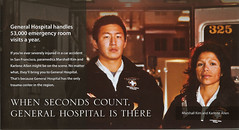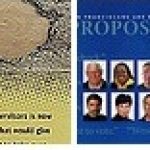By Matthew Hirsch, Newsdesk.org/The Public Press
 |
|
| View our annotated Flickr collection to see how pro-Propositon A activists are spinning the issue in campaign fliers. |
The proponents of Proposition A want voters to believe that the Nov. 4 election is a matter of life or death for San Francisco’s main public hospital.
The measure has an enormous list of supporters, including elected officials, newspapers, community groups, and the local Democratic, Republican and Green parties. The campaign ads also feature long endorsement lists and descriptions of health care specialists who provide essential medical services.
However, these ads misrepresent some of the facts. And they appeal to the lowest common denominator in politics — quality health care, something everybody supports — without taking on more difficult questions raised by the campaign.
Unchecked Assertions
Proponents say voters can "save" San Francisco General Hospital by approving an $887-million bond measure to build a new medical facility in place of the existing one. If the campaign fails, they say, the 154-year-old hospital could be forced to close because of stringent earthquake safety standards that will soon take effect.
There’s no organized opposition campaign to refute these claims. But according to the state agency that oversees hospital and nursing facility construction projects, the deadline for rebuilding SF General is more flexible than the Proposition A campaign makes it seem.
In one campaign advertisement mailed to San Francisco voters, two hospital administrators say: "California law requires that all acute care hospitals meet seismic standards or close by 2013."
In fact, the state legislature in 2006 gave hospitals an option for a two-year extension until 2015.
And last year, the legislature approved another extension that would last until 2020.
Another Proposition A campaign ad shows a picture of two paramedics, with the text: "If you’re ever severely injured in a car accident in San Francisco … they’ll bring you to General Hospital. That’s because General Hospital has the only trauma center in the region."
This claim depends on your definition of the word "region."
SF General is the only trauma center in San Francisco, and as a Level I trauma center it also serves northern San Mateo County.
But according to the American College of Surgeons, there are six verified trauma centers in the San Francisco Bay region, including Level I trauma centers at Stanford University and in San Jose.
By comparison, a single Level I trauma center in Seattle serves the entire state of Washington, plus Alaska, Idaho and Montana.
Proposition A campaign spokesman Chuck Finnie said, "When we talk about the region, we’re talking about the practical distances that are able to save lives for people who’ve suffered traumatic injury."
As for the deadlines for seismic safety, Finnie didn’t dispute that SF General can request an extension past 2013.
"If you want to point out that state authorities say there are avenues for extensions, go for it. I don’t think we’re going to need it. I think we’re going to pass this thing," he said.
Finnie has good reason to be confident on the eve of the election, given its long list of supporters and endorsements.
Official Opposition
The official opponents of Proposition A, who have no formal campaign organization, are Mara Kopp and George Wooding — both west-side neighborhood activists.
Kopp is a frequent advocate for government oversight and an opponent of local spending measures. In opposing Proposition A, she and Wooding claim that the bond measure understates the true cost of the SF General reconstruction project.
They claim less expensive design plans that would limit the tax burden are available and question whether the city could pursue alternatives to municipal bond financing, such as by tapping anticipated settlement funds from tobacco litigation.
The Yes on Proposition A campaign argues in response that rebuilding the hospital won’t increase property taxes because the city will have repaid debt from other projects as it assumes new debt for this one.
The campaign also claims that if the bond measure doesn’t pass, any future construction will be more expensive because of escalating hospital construction costs.
In other words, they say it might be now or never for SF General.
The San Francisco 2008 Election Truthiness Report is co-produced by Newsdesk.org and The Public Press, and funded through small donations using the Spot.Us "crowdfunding" Web site.
Freelance writer Matthew Hirsch has produced work that has appeared in SF Weekly and Bloomberg News. His journalism career began when he was a reporter for The Chariot, the student newspaper at J.P. Taravella High School, in Coral Springs, Fla.







